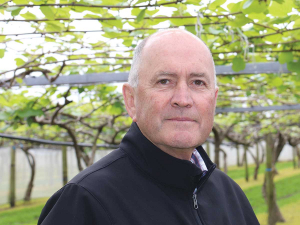EPA remains committed to deliver improved outcomes
OPINION: At the end of my first year as chair of the Environmental Protection Authority (EPA), I have been reflecting on the progress made in the time I have been in the role.
 Hort NZ chair Barry O'Neil says unrelenting cost increases means growers are either not making any money or losing money as result of the current situation.
Hort NZ chair Barry O'Neil says unrelenting cost increases means growers are either not making any money or losing money as result of the current situation.
Horticulture NZ says 2022 is presenting more challenges than ever before.
Hort NZ chair Barry O'Neil says while the apple and kiwifruit harvests are in full swing, there is a degree of nervousness across the sector.
Firstly, there are labour shortages. O'Neil notes that while the Government has tried to help, increasing the cap on RSE workers from 14,000 to 16,000, other factors - such as Covid in the Pacific Islands and the Tongan volcano eruption - have impacted on the availability of RSE workers. He says, at present, there are only 10,000 of these workers in NZ and some have been here for a very long time due to the pandemic.
"Meanwhile, the cost of inputs such as fertiliser, seed and fuel have increased and overall input costs have risen by between 20% and 50%," O'Neil adds. "The added problem with these rises is that they have taken place in such a short period of time and this has meant that the value of the products hasn't kept pace with the speed of the rising inputs."
He says the result is a number of sectors are either not making any money or losing money as result of the current situation.
O'Neil says fertiliser costs have doubled in the past two years and, while road user charges have been reduced, this doesn't apply to diesel used on farm, which for many growers is a significant cost.
"The opportunities that were there for certain crops a few years ago have now been challenged by the growing government and international policy settings."
With rising costs and the pressure from government on compliance issues, O'Neil told Hort News that a lot more orchards have been up for sale and/or either replanted in other crops or amalgamated into larger orchards.
He says in the last five or so years there has been a trend away from the smaller family orchards into more corporate and commercial operations. He notes this is a trend right across the ag sector and not confined to horticulture.
"The other factor is getting product to market. It's not just the logistics issue of getting your box of products on a ship or getting it to market - it's the cost involved," O'Neil explains.
"Shipping container costs have gone through the roof and so have air freight costs. All these cost increases have an impact on the bottom line of growers."
The World Wide Sires National All Day Breeds Best Youth Camp Best All Rounder plaudit has become family affair, with 2026 Paramount Cup winner Holly Williams following in her sister Zara's footsteps.
DairyNZ is giving New Zealand farmers a unique opportunity to gain hands-on governance and leadership experience within the dairy sector.
Herd improvement company LIC has posted a 5.2% lift in half-year revenue, thanks to increasing demand for genetics.
According to the latest Fresh Produce Trend Report from United Fresh, 2026 will be a year where fruit and vegetables are shaped by cost pressures, rapid digital adoption, and a renewed focus on wellbeing at home.
The Roar is a highlight of the game hunting calendar in New Zealand, with thousands of hunters set to head for the hills to hunt male stags during March and April.
OPINION: The past few weeks have been tough on farms across the North Island: floods and storms have caused damage and disruption to families and businesses.

OPINION: Meanwhile, red blooded Northland politician Matua Shane Jones has provided one of the most telling quotes of the year…
OPINION: This old mutt has been around for a few years now and it seems these ‘once in 100-year’ weather…